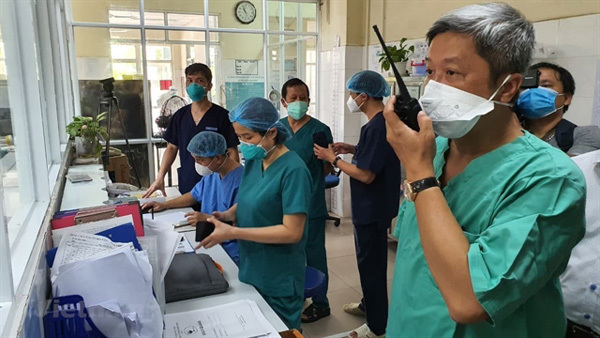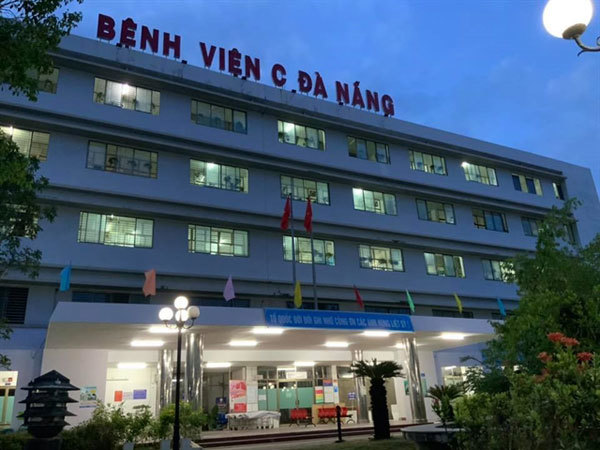with infections reported in the city’s major hospitals.
 |
| Deputy Health Minister Nguyen Truong Son directs COVID-19 prevention and control in Da Nang during the pandemic resurgence last year. Photo vietnamplus.vn |
How did you feel when you were assigned as a leader in the fight against COVID-19 in the central city of Da Nang last year?
It was a big challenge for me at that time. We – the special task force of the health ministry, arrived in Da Nang with the assignment to minimise the number of new infections, COVID-19 deaths and increase recovery cases. We were also expected to help Da Nang improve its ability in COVID-19 prevention and control.
With such pressure, without the co-operation of colleagues and Da Nang authorities, I would not have completed the assignment. The directions from central agencies, the National Steering Committee for COVID-19 Prevention and Control, the Ministry of Health and leading doctors from Hanoi, Hue and HCM City were also very helpful to us.
The team including many senior experienced doctors across the country discussed and selected strategies in disease prevention, treatment and improved testing capacity so they would be most suitable to Da Nang’s situation at that time.
As COVID-19 resurged in Da Nang last July, many health workers volunteered on the pandemic front lines. What do you think about their actions?
I highly appreciated people from across the country volunteering to Da Nang, working in the front lines in the fight against COVID-19.
At that time, the pandemic was developing complexly with three major hospitals in the city under lockdown due to confirmed COVID-19 cases.
Before I left Hanoi for Da Nang, Prime Minister Nguyen Xuan Phuc and the acting health minister told me to work with the National Steering Committee and local agencies to soon control the disease.
To me, that was a task to fulfil. I told myself that I would return to Hanoi only when I had fulfilled the task.
The other health workers who volunteered to go to Da Nang at that time were also willing to take tasks on the pandemic front lines. We were all ready for the tasks and were all determined to return home when we successfully helped control the pandemic in Da Nang.
What do you remember most during the tough time in Da Nang?
I remember the very first days we arrived in Da Nang. It was the toughest time. At that time, all patients with serious health conditions in Da Nang C Hospital and Da Nang General Hospital were moved to other hospitals such as Hue Central Hospital.
We set up two field hospitals at Hoa Vang District Health Centre and Da Nang Lung Hospital and started receiving COVID-19 patients. The number of locally-transmitted cases and deaths increased daily, even in hospitals.
I remember that we saw four deaths on the same day. That was such a bad day that I can describe exactly my feelings. It was like a huge burden pressed on my heart, on my shoulders. But then, I recognised that if my colleagues saw my weakness or disappointment, they would feel disappointed and weak too. So, I decided to keep strong.
What pressure did you face at that time?
We faced many pressures and difficulties. First, we saw the pandemic spreading widely across Da Nang. Second, many patients with serious medical conditions were infected with COVID-19. Despite our efforts, we failed to save some of them.
The first death relating to COVID-19 in Vietnam was reported in Da Nang, which put medical workers there under high pressure. To date, 35 deaths have been reported.
The third major pressure was about the decision to impose social distancing measures in Da Nang in the middle of August. Some called for stricter measures like putting the city under lockdown as China did to Wuhan.
At that time, chairman of Da Nang City People’s Committee Huynh Duc Tho asked us – the ministerial special task force – if lockdown was needed. We were very conflicted as lockdown could make the whole city's economy sluggish.
With evidence collected from our visits to the city’s concentrated quarantine areas, production facilities and treatment areas, we confidently suggested lockdown was not needed. We recommended Da Nang authorities continue to implement Prime Minister’s Directive No16 on social distancing but in a stronger, more drastic and determined manner. We called it Directive 16+.
What did you feel when the last COVID-19 patients in Da Nang recovered?
I was more than happy. When the last Da Nang COVID-19 patient recovered, I was in Hanoi. I and other members of the ministry’s specialised task force met for a party to toast our success. We had fulfilled our responsibilities.
What are the keys for Vietnam to maintain its success in the fight against COVID-19?
I think that the most important factor is the active and determined participation of all sectors, agencies and people. The public play a very important role in the COVID-19 fight. If everyone is aware of the need to protect themselves, join reporting and detecting suspected cases, we will actively and effectively control the disease.
Medical workers must stay alert all the time. They work on the front lines during the pandemic so they must not neglect their duty. VNS

Doctor’s diary in locked down Da Nang hospital
A doctor from Da Nang C Hospital, Dang Van Tri, was working in the lockdown zone in Da Nang City as the COVID-19 pandemic spread in the community.

COVID-19 prevention work in Da Nang on the right track
Deputy Minister of Health Nguyen Truong Son, who led a ministerial special task force to Da Nang to help with COVID-19, speaks to the press on pandemic prevention and combat work.